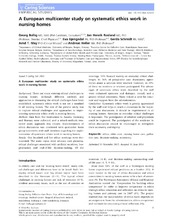| dc.contributor.author | Bollig, Georg | en_US |
| dc.contributor.author | Rosland, Jan Henrik | en_US |
| dc.contributor.author | Gjengedal, Eva | en_US |
| dc.contributor.author | Schmidt, Gerda | en_US |
| dc.contributor.author | May, Arnd T. | en_US |
| dc.contributor.author | Heller, Andreas | en_US |
| dc.date.accessioned | 2017-03-16T13:25:44Z | |
| dc.date.available | 2017-03-16T13:25:44Z | |
| dc.date.issued | 2016 | |
| dc.identifier.issn | 1471-6712 | |
| dc.identifier.uri | https://hdl.handle.net/1956/15597 | |
| dc.description.abstract | Background: There are many existing ethical challenges in nursing homes. Although different methods and approaches to discussing the ethical challenges have been established, systematic ethics work is not yet a standard in all nursing homes. The aim of the present study was to explore ethical challenges and approaches to implementing systematic ethics work in nursing homes. Methods: Data from five institutions in Austria, Germany and Norway were collected, and a mixed-methods twotiered study approach was chosen. Documentation of ethics discussions was combined with qualitative focus group interviews with staff members regarding the implementation of systematic ethics work in nursing homes. Results: One hundred and five ethics meetings were documented. The main topics were advance care planning, ethical challenges associated with artificial nutrition, hospitalisation and end-of-life decision-making. Of the meetings, 33% focused mainly on everyday ethical challenges. In 76% of prospective case discussions, agreements about a solution were reached; however, in 29% of these no residents or relatives participated. The advantages of systematic ethics work described by the staff were enhanced openness and dialogue, overall, and a greater ethical awareness. Many voiced a need for structure and support from the administration. Conclusions: Systematic ethics work is greatly appreciated by the staff and helps to reach a consensus in the majority of case discussions. It should be implemented in all nursing homes. Attention to everyday ethical challenges is important. The participation of relatives and physicians could be improved. The participation of the residents’ in ethics discussions should be encouraged to strengthen their autonomy and dignity. | en_US |
| dc.language.iso | eng | eng |
| dc.publisher | Wiley | eng |
| dc.relation.ispartof | <a href="http://hdl.handle.net/1956/15598" target="_blank">Ethical challenges, decision-making and end-of-life care in nursing homes</a> | |
| dc.rights | Attribution CC BY | eng |
| dc.rights.uri | http://creativecommons.org/licenses/by/4.0/ | eng |
| dc.subject | Ethics | eng |
| dc.subject | elder care | eng |
| dc.subject | nursing home care | eng |
| dc.subject | Palliative care | eng |
| dc.subject | decision-making | eng |
| dc.subject | autonomy | eng |
| dc.title | A European multicenter study on systematic ethics work in nursing homes | en_US |
| dc.type | Peer reviewed | |
| dc.type | Journal article | |
| dc.description.version | publishedVersion | en_US |
| dc.rights.holder | Copyright 2016 The Author(s) | |
| dc.identifier.doi | https://doi.org/10.1111/scs.12373 | |
| dc.source.journal | Scandinavian Journal of Caring Sciences | |

